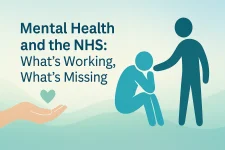When you’re struggling with your mental health, finding help should be simple — but for many people in the UK, the reality is far more complicated.
The NHS (National Health Service) plays a vital role in mental health care, offering free access to everything from talking therapies to crisis intervention. But as demand grows, cracks are beginning to show.In this article, we’ll take a friendly, honest look at:
- What the NHS does well for mental health
- Where it’s struggling
- What you can do if you need help now
Despite challenges, there’s a lot the NHS gets right — and it’s important to acknowledge that:
1. Free Access to Mental Health ServicesThe NHS provides access to therapy, psychiatric support, and medication at no cost, which is rare globally. Services like IAPT (Improving Access to Psychological Therapies) offer talking therapies for common conditions like anxiety and depression.
2. Crisis Support Services
Every local NHS Trust has a 24/7 crisis line. NHS mental health crisis teams can support people at risk of harm, offering emergency assessments and safety planning.
3. Specialist Services
From eating disorder units to perinatal mental health support, the NHS offers a wide range of specialist care for complex needs — if referred appropriately.
4. Integration with GPs
Your GP can be your first step to mental health support, offering referrals, medication, and monitoring. Most GPs are sympathetic and understand mental health is just as important as physical health.
While the NHS does amazing work, it’s no secret that the system is under pressure — and that affects people seeking help.
1. Long Waiting TimesDepending on your area, waiting times for therapy through IAPT can range from 6 weeks to over 6 months. For specialist services, waits can be even longer.
2. Underfunding and Staff Shortages
Mental health services receive only around 8% of the NHS budget despite rising demand. Staff burnout, vacancies, and stretched resources make it harder for patients to get consistent care.
3. Inconsistent Support by Region
Access can be a postcode lottery. One area might have fast referrals and multiple services — another might offer the bare minimum. This inequality leaves many feeling lost.
4. Lack of Early Intervention
Often, people must reach a crisis point before they receive meaningful support. Early help could prevent escalation — but resources often don’t allow for that.
If you’re struggling with your mental health in the UK, don’t give up — help is available.
- Start with your GP.
Even if waiting lists are long, getting your name on one is the first step. GPs can also offer short-term support. - Ask for Talking Therapies Directly.
You can self-refer to NHS IAPT services here: https://www.nhs.uk/service-search/mental-health/find-a-psychological-therapies-service - Use 24/7 Mental Health Helplines.
NHS urgent mental health support by region: https://www.nhs.uk/service-search/mental-health/find-an-urgent-mental-health-helpline - Look into Charities and Peer Support.
Charities like Mind, Samaritans, and local services often provide quicker access to talking support, peer groups, or helplines.
The NHS is full of hardworking, caring people — doctors, nurses, therapists — doing their absolute best. But the system they work in is stretched, underfunded, and in urgent need of reform. We need to keep talking about this — not to criticise the NHS, but to advocate for the care we all deserve. Because mental health is health, and it should be treated with the same urgency and respect.
If you’re reading this and you’re struggling, please know: you are not alone, and there is support out there — even if it takes time to find.

